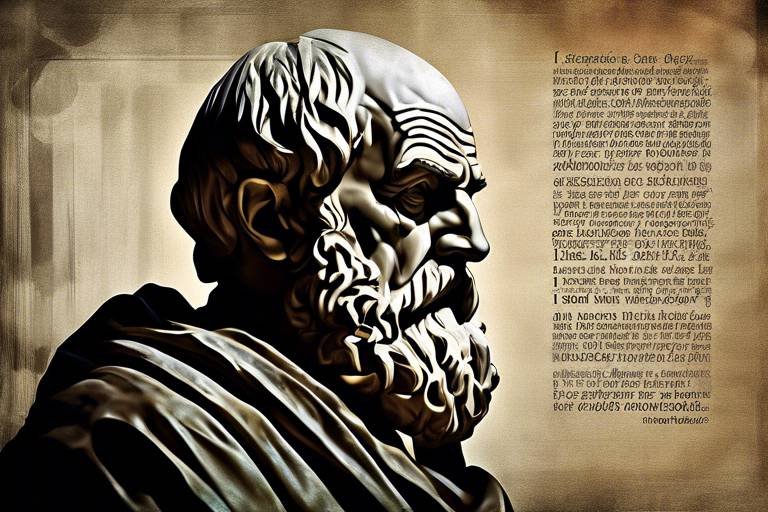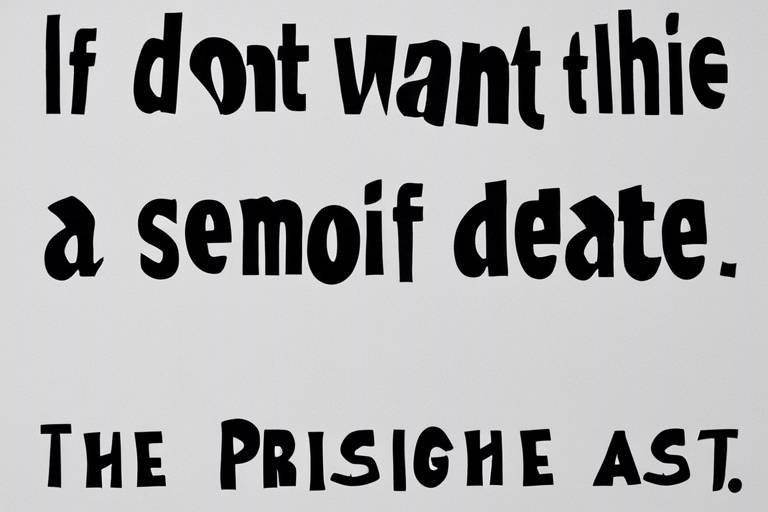Socrates on Virtue - A Modern Interpretation
In a world that often feels chaotic and morally ambiguous, the teachings of Socrates on virtue resonate more than ever. His profound insights into the nature of virtue not only shaped the philosophical landscape of ancient Greece but continue to influence modern thought. So, what exactly did Socrates mean by virtue, and why should we care about it today? This article aims to explore his views, unravel their complexities, and demonstrate their relevance in our contemporary lives.
At the heart of Socratic philosophy lies the idea that virtue is synonymous with knowledge. Socrates believed that if one truly understands what is good, they will naturally do good. This perspective challenges us to consider the importance of education and self-reflection in our pursuit of moral excellence. The essence of virtue, then, becomes a quest for understanding—not just of the world around us, but of ourselves. Imagine navigating a ship without a compass; it is only through understanding our moral bearings that we can steer ourselves toward a fulfilling life.
Furthermore, Socrates' approach to virtue is not merely theoretical; it is practical and deeply personal. He famously engaged in dialogues with his contemporaries, encouraging them to question their beliefs and assumptions. This method of inquiry, known as the Socratic Method, is a powerful tool for self-discovery. It invites us to examine our values and consider whether they truly align with our actions. Through this process, we can uncover the layers of our moral character and strive for a more virtuous existence.
In today's fast-paced society, where external influences often dictate our decisions, Socrates' emphasis on self-knowledge and virtue serves as a crucial reminder. By fostering a deeper understanding of ourselves, we can navigate the complexities of modern life with greater clarity and purpose. The journey of self-discovery is not always easy, but it is essential for cultivating a life rooted in integrity and ethical living.
As we delve deeper into Socratic principles, we will explore how dialogue can serve as a catalyst for personal growth. Engaging in conversations about virtue not only enhances our understanding but also connects us with others who share similar values. This communal aspect of virtue is vital; it reminds us that we are not alone in our quest for moral clarity. In essence, Socratic dialogue acts as a mirror, reflecting our beliefs and prompting us to reconsider them in light of new insights.
In summary, Socrates' views on virtue offer a rich tapestry of ideas that challenge us to think critically about our moral lives. By embracing the principles of self-knowledge, dialogue, and the pursuit of understanding, we can navigate the complexities of the modern world with a renewed sense of purpose. As we continue to explore these themes, we will uncover practical applications that can enhance our daily lives and lead us toward true happiness.
- What is the Socratic Method? The Socratic Method is a form of cooperative argumentative dialogue that stimulates critical thinking and illuminates ideas through questioning.
- How does Socrates define virtue? Socrates defines virtue as knowledge, suggesting that understanding what is good will lead individuals to act accordingly.
- Why is self-knowledge important in the pursuit of virtue? Self-knowledge allows individuals to understand their values and beliefs, which is essential for making ethical decisions and living a virtuous life.
- Can Socratic principles be applied in everyday life? Yes, engaging in dialogue, questioning assumptions, and seeking knowledge can be integrated into daily interactions to foster personal growth and ethical living.

The Essence of Virtue
Understanding the fundamental nature of virtue is crucial to grasping not just Socrates' philosophy but also its impact on our modern lives. Socrates, the great Greek philosopher, believed that virtue was not merely an abstract concept but a practical guide to living well. He defined virtue as knowledge—specifically, knowledge of what is good, just, and right. This perspective suggests that if we truly know what is virtuous, we will naturally act in accordance with it. But what does this mean for us today?
In ancient times, virtue was often associated with specific qualities, such as courage, temperance, and wisdom. These characteristics were not just ideals to strive for; they were essential for achieving a well-ordered life. Socrates argued that understanding these virtues leads to a harmonious existence. For instance, he famously stated, “No one does wrong willingly.” This implies that if someone acts immorally, it is due to ignorance rather than a deliberate choice to do evil. In this sense, the essence of virtue is deeply intertwined with knowledge and self-awareness.
In the modern context, we might ask ourselves: how do we define virtue? Is it still about noble qualities, or has the meaning evolved? Today, virtue can encompass a broader range of attributes, including empathy, integrity, and social responsibility. The essence of virtue is not just about individual character but also about how we interact with others and contribute to society. This shift reflects the growing importance of community and relationships in defining what it means to live virtuously.
Moreover, the Socratic view emphasizes that virtue is universal. It transcends cultural and temporal boundaries. Whether in ancient Athens or modern-day New York, the quest for virtue remains a common thread in the human experience. This universality invites us to explore our own understanding of virtue and how it manifests in our lives. Are we living in accordance with our values? Are we aware of the virtues we hold dear?
| Virtue Quality | Ancient Interpretation | Modern Interpretation |
|---|---|---|
| Courage | Bravery in battle | Standing up for what is right |
| Temperance | Moderation in pleasures | Balance in lifestyle choices |
| Wisdom | Knowledge of the good | Critical thinking and insight |
In summary, the essence of virtue is about understanding and embodying qualities that lead to a fulfilling life. It challenges us to reflect on our values and how they shape our actions. By engaging with Socratic principles, we can cultivate a deeper understanding of what it means to live virtuously, not just for ourselves but for the greater good of our communities and society at large.

Socratic Method and Virtue
The Socratic method is not just a fancy term thrown around in philosophy classes; it’s a dynamic approach to learning and understanding that involves asking questions and engaging in dialogue. Think of it as a mental workout, where the goal is to flex your intellectual muscles and dig deep into the essence of virtue. Socrates believed that through questioning, individuals could uncover their own beliefs about virtue and morality, leading to greater self-awareness and understanding of one’s ethical compass. This method encourages individuals to challenge their assumptions and encourages a profound exploration of what it means to live a virtuous life.
At its core, the Socratic method is about dialogue—real, engaging conversations that push us to think critically. It’s like peeling an onion; each question peels away a layer of ignorance, bringing us closer to the core of our understanding. This process can feel uncomfortable at times, as it forces us to confront beliefs we may have taken for granted. However, the discomfort is often where the magic happens, leading to significant personal growth and insights into our moral character.
Engaging in dialogue serves as a powerful tool for self-discovery, allowing us to articulate our thoughts and beliefs. When we discuss virtue with others, we not only share our views but also challenge them against different perspectives. This interaction can illuminate blind spots in our understanding. For instance, consider a conversation about honesty. You might believe that honesty is always the best policy, but through dialogue, you may discover nuances that challenge that belief, such as the importance of tact or kindness in certain situations.
Real-life examples of Socratic dialogue can be incredibly enlightening. Imagine a group of friends discussing what it means to be courageous. One person might share a personal story of standing up for a friend, while another might recount a moment of fear that held them back. Through this exchange, they can explore the complexity of courage—is it always about bold actions, or can it also be about vulnerability? These discussions can reveal personal values and encourage individuals to reflect on their own definitions of virtue.
However, engaging in Socratic dialogue is not without its challenges. People often face obstacles such as defensiveness, misunderstanding, or a reluctance to question their own beliefs. It’s essential to approach these conversations with an open mind and a willingness to listen. A few common challenges include:
- Defensiveness: When beliefs are challenged, it’s natural to feel defensive. Recognizing this emotion can help individuals remain open to new ideas.
- Miscommunication: Different interpretations of questions and answers can lead to confusion. Clarifying terms and meanings can bridge this gap.
- Fear of Judgment: Some may hesitate to share their thoughts for fear of being judged. Creating a safe space for dialogue is crucial.
By acknowledging these challenges, individuals can navigate discussions more effectively, fostering an environment where genuine exploration of virtue can thrive.
Ultimately, the Socratic method is a journey rather than a destination. It’s about the continuous pursuit of knowledge and understanding, where the quest for virtue becomes an integral part of our lives. By embracing this method, we not only learn about virtue but also cultivate it within ourselves, leading to a more meaningful and ethical existence.

Dialogue as a Tool
When we think about dialogue, it's easy to see it as just a way to exchange words. However, in the context of Socratic philosophy, dialogue becomes a powerful tool for self-discovery and understanding. Socrates believed that through conversation, individuals could challenge their own beliefs and uncover deeper truths about themselves and the world around them. Imagine sitting down with a friend over coffee, discussing what it means to be a good person. This simple act of talking can lead to profound insights, much like peeling back the layers of an onion to reveal its core.
Engaging in dialogue requires us to be open-minded and willing to question our own assumptions. It’s not just about defending our own views, but rather exploring the perspectives of others. This can be likened to navigating a maze; each question we ask can lead us down different paths, some of which may surprise us. For example, you might start a conversation believing that honesty is the most important virtue, but through discussion, you might come to realize that compassion also plays a critical role in ethical living.
Moreover, dialogue serves as a mirror, reflecting our values and beliefs back to us. When we articulate our thoughts and listen to others, we often find ourselves reevaluating our positions. It’s in this back-and-forth that we can identify inconsistencies in our reasoning and refine our understanding of virtue. Consider the following benefits of engaging in Socratic dialogue:
- Enhanced Clarity: Discussing complex ideas helps clarify our thoughts.
- Broadened Perspectives: Listening to others exposes us to different viewpoints.
- Increased Empathy: Understanding others' experiences fosters empathy and compassion.
- Critical Thinking: Questioning assumptions strengthens our critical thinking skills.
However, it’s important to recognize that not all dialogue is easy. Sometimes, confronting our beliefs can be uncomfortable. Just like a workout that pushes our limits, engaging in deep conversations can be challenging but ultimately rewarding. By embracing the discomfort, we can grow and evolve in our understanding of virtue.
In conclusion, dialogue is not merely a means of communication; it is a vital tool for personal growth and ethical exploration. By participating in meaningful conversations, we can uncover our values, challenge our beliefs, and ultimately live more virtuous lives. So, the next time you find yourself in a discussion, remember the potential it holds for self-discovery and moral understanding.

Case Studies in Dialogue
The beauty of Socratic dialogue lies in its ability to peel back the layers of our understanding, revealing the core of our beliefs about virtue. To illustrate this, let’s dive into a couple of real-life case studies that showcase how engaging in dialogue can lead to profound self-discovery and a clearer understanding of one’s values.
In one instance, a group of university students participated in a discussion about honesty. Initially, they believed that honesty was simply about not lying. However, as they engaged in a Socratic dialogue, they began to question the nuances of honesty. One student posed a thought-provoking question: "Is it always wrong to withhold the truth?" This question opened the floodgates for deeper exploration. The students discussed scenarios where withholding information might protect someone's feelings or even save a life. Through this dialogue, they uncovered a more complex understanding of honesty that included not just the act of telling the truth but also the intention behind their words. This case study illustrates how dialogue can transform a simplistic view into a nuanced understanding of virtue.
Another compelling example comes from a workplace setting where a team was grappling with the concept of integrity. During a team-building exercise, the facilitator employed the Socratic method by asking open-ended questions such as, "What does integrity mean to you?" and "Can you think of a time when you felt your integrity was challenged?" As team members shared their personal experiences, they realized that integrity was not just about following the rules; it was also about aligning actions with personal values. One participant shared a story about a time they reported unethical behavior in the workplace, despite the potential backlash. This sparked a rich discussion about the courage required to uphold integrity in challenging situations. The dialogue not only enhanced their understanding of integrity but also fostered a stronger sense of trust within the team.
These case studies highlight the transformative power of Socratic dialogue. By engaging in thoughtful, open discussions, individuals can uncover deeper insights about their values and beliefs. They learn that virtue is not a static concept but a dynamic interplay of thoughts, actions, and intentions. This process of self-discovery is invaluable, as it empowers individuals to live more authentically and align their actions with their core beliefs.
However, it’s important to acknowledge that engaging in Socratic dialogue isn’t always easy. Participants may feel vulnerable when exposing their beliefs to scrutiny. Yet, it is precisely this vulnerability that paves the way for growth. By fostering an environment of trust and openness, individuals can navigate the challenges of dialogue and emerge with a richer understanding of virtue.
- What is Socratic dialogue? Socratic dialogue is a form of cooperative argumentative dialogue that stimulates critical thinking and illuminates ideas through questions and answers.
- How can I apply Socratic principles in my daily life? You can apply Socratic principles by engaging in reflective conversations, asking open-ended questions, and being willing to explore your beliefs and values deeply.
- What are the benefits of Socratic dialogue? Benefits include enhanced self-awareness, improved critical thinking skills, and a deeper understanding of moral and ethical concepts.
- Can Socratic dialogue be used in professional settings? Absolutely! Socratic dialogue can enhance teamwork, foster trust, and lead to better decision-making in professional environments.

Challenges in Dialogue
Engaging in Socratic dialogue can often feel like navigating a maze filled with twists and turns. While the intention behind this method is to foster understanding and uncover deeper truths, participants frequently encounter several challenges that can hinder productive discussions. One significant hurdle is the fear of vulnerability. People may hesitate to express their thoughts or admit uncertainty, worrying about how they will be perceived by others. This fear can stifle genuine conversation, leading to surface-level exchanges rather than meaningful exploration of virtue.
Another challenge is the tendency for individuals to become defensive when their beliefs are questioned. Instead of embracing the opportunity for growth, they may feel attacked, which can lead to an argumentative atmosphere rather than a collaborative one. This defensiveness can create a barrier to understanding, making it difficult for participants to engage openly and honestly. Moreover, differing communication styles can complicate dialogue. Some individuals may prefer a direct approach, while others might lean towards a more nuanced, reflective style. These differences can create misunderstandings that detract from the overall goal of the conversation.
Additionally, the complexity of the topics being discussed can be overwhelming. Virtue, morality, and ethics are not always black and white; they often exist in shades of gray. This ambiguity can lead to confusion and frustration, making participants feel lost in the conversation. To combat these challenges, it's essential to establish a safe and respectful environment where all voices are valued. Encouraging active listening and fostering empathy can help bridge the gaps that often arise during discussions of virtue.
Here are some common challenges faced in Socratic dialogue:
- Fear of Vulnerability: Participants may hesitate to share their thoughts due to concerns about judgment.
- Defensiveness: Questioning beliefs can lead to a defensive stance, hindering open dialogue.
- Differing Communication Styles: Varied approaches to conversation can create misunderstandings.
- Complexity of Topics: The intricate nature of virtue can lead to confusion and frustration.
By acknowledging these challenges and actively working to overcome them, individuals can create a more enriching dialogue that not only enhances their understanding of virtue but also strengthens their moral character. Ultimately, the journey through these discussions can lead to profound insights and personal growth, making the effort worthwhile.
- What is the Socratic method?
The Socratic method is a form of cooperative argumentative dialogue that stimulates critical thinking and illuminates ideas through questioning.
- How can I engage in Socratic dialogue effectively?
To engage effectively, practice active listening, maintain an open mind, and encourage a respectful exchange of ideas.
- What are the benefits of Socratic dialogue?
Socratic dialogue promotes self-discovery, enhances understanding of complex concepts, and fosters deeper connections with others.
- Can Socratic dialogue help in personal development?
Absolutely! It encourages reflection on one's beliefs and values, leading to personal growth and ethical living.

Self-Knowledge and Virtue
Self-knowledge is often hailed as the cornerstone of ethical living, and when it comes to understanding virtue, it's absolutely essential. Imagine trying to navigate a ship without knowing how to read a map; that’s what it’s like to pursue virtue without self-awareness. Socrates believed that one must first know oneself to truly grasp what it means to live a virtuous life. He famously stated, “The unexamined life is not worth living,” highlighting the importance of introspection in our moral journey.
But what does self-knowledge really entail? It goes beyond just knowing your likes and dislikes; it’s about understanding your values, motivations, and the impact of your actions on others. This deep dive into your own psyche can be challenging, yet it is incredibly rewarding. By engaging in self-reflection, you can identify your strengths and weaknesses, allowing you to cultivate virtues that align with your true self.
Consider this: when you understand your core beliefs, you can make choices that reflect those beliefs. This alignment between your actions and values leads to a more authentic and fulfilling life. For instance, if you value honesty but often find yourself telling white lies, you may feel a disconnect that can lead to inner turmoil. Recognizing this inconsistency is the first step toward rectifying it and moving toward a more virtuous existence.
In the pursuit of self-knowledge, Socratic dialogue serves as a powerful method. Engaging in conversations with others helps to challenge your assumptions and uncover deeper insights about your beliefs. Here are a few ways to incorporate this into your life:
- Ask Questions: Don’t be afraid to question your own beliefs. Why do you hold them? Are they based on personal experiences or societal influences?
- Seek Feedback: Ask trusted friends or mentors for their perspectives on your actions and character. Their insights can illuminate blind spots you may not see.
- Reflect Regularly: Set aside time for reflection. Journaling can be an excellent way to explore your thoughts and feelings, helping you identify patterns in your behavior.
Moreover, self-knowledge is not a one-time achievement; it’s an ongoing process. As you grow and evolve, so too should your understanding of yourself and your virtues. This journey can lead to a more fulfilling life, where your actions are not just reactions but deliberate choices that resonate with your moral compass.
In essence, the relationship between self-knowledge and virtue is symbiotic. The more you know yourself, the better equipped you are to act virtuously. And in acting virtuously, you gain deeper insights into your true self. It’s a beautiful cycle that fosters personal growth and ethical integrity. So, take the plunge into self-discovery; it might just be the key to unlocking a more virtuous and meaningful life.
Q: How can I start the journey of self-knowledge?
A: Begin by setting aside time for reflection. Journaling, meditating, or simply sitting in silence can help you connect with your inner thoughts and feelings.
Q: Is it necessary to consult others for self-knowledge?
A: While self-reflection is crucial, seeking feedback from trusted individuals can provide valuable perspectives and help you see blind spots in your understanding.
Q: Can self-knowledge lead to changes in my values?
A: Absolutely! As you learn more about yourself, you may find that your values evolve. This is a natural part of personal growth.

Virtue and Happiness
Socrates famously asserted that virtue is not just a moral compass, but a pathway to true happiness. Imagine navigating through life without a map; that’s what it’s like living without virtue. Socrates believed that when we embody virtue, we align ourselves with our highest potential, leading to genuine fulfillment. But how does this relationship between virtue and happiness actually work? It’s a fascinating interplay that has resonated throughout centuries, influencing countless thinkers and shaping modern ethical discussions.
At its core, virtue involves qualities like honesty, courage, and wisdom. These traits do more than just make us good people; they act as the foundation for a happy life. When we practice virtue, we engage in actions that not only benefit ourselves but also uplift those around us. It’s like planting a garden—nurturing your virtues allows them to blossom, ultimately creating a vibrant community. In contrast, when we stray from virtuous living, we often find ourselves in a cycle of dissatisfaction and regret, much like weeds choking a beautiful garden.
Interestingly, the connection between virtue and happiness can be broken down into several key aspects:
- Integrity: Living a life of integrity—where actions align with values—creates a sense of inner peace. This peace is a cornerstone of happiness.
- Relationships: Virtue fosters trust and respect in relationships, leading to deeper connections and emotional support, which are essential for happiness.
- Meaning and Purpose: Engaging in virtuous actions often provides a sense of purpose, contributing to overall life satisfaction.
However, it’s essential to recognize that happiness is subjective. What brings joy to one person may not resonate with another. This is where Socratic philosophy shines. By encouraging self-exploration and dialogue, individuals can uncover what happiness means to them in the context of virtue. It’s about finding that sweet spot where personal values meet the greater good.
In today’s fast-paced world, many people chase fleeting pleasures—material wealth, social status, or instant gratification—believing these will lead to happiness. Yet, Socrates would argue that such pursuits are misguided. True happiness is not found in external possessions but in the richness of our character and the depth of our relationships. It’s about creating a life that reflects our values and beliefs, leading to a more profound sense of fulfillment.
To illustrate this point, consider the following table that compares fleeting happiness with the lasting joy derived from virtue:
| Aspect | Fleeting Happiness | Lasting Joy from Virtue |
|---|---|---|
| Source | External factors (money, status) | Internal values (integrity, compassion) |
| Duration | Short-lived | Enduring |
| Impact on Others | Often selfish | Uplifting and community-oriented |
| Emotional State | Temporary highs and lows | Consistent contentment |
As we navigate our own lives, it’s worth pondering: Are we chasing after the quick fixes, or are we investing in our character? Socrates would encourage us to engage in self-reflection, asking ourselves tough questions about our values and the choices we make. This process not only helps us align with our virtues but also illuminates the path to genuine happiness.
In conclusion, the relationship between virtue and happiness is not just a philosophical idea; it’s a practical guide for living a fulfilling life. By embracing our virtues, we can cultivate lasting happiness that transcends the superficial. So, let’s take a page from Socrates’ book and strive to live virtuously, for in doing so, we may just find the happiness we seek.
- What is the main idea behind Socrates' view of virtue?
Socrates believed that virtue is essential for achieving true happiness, suggesting that moral character leads to a fulfilling life. - How can I apply Socratic principles to my life?
Engage in self-reflection and dialogue with others to explore your values and understand how they influence your happiness. - Is happiness the same for everyone?
No, happiness is subjective; what brings joy to one person may differ for another. Understanding your values can help you find your own path to happiness.

Modern Perspectives on Happiness
When we think about happiness today, it often feels like we’re navigating a complex maze filled with bright billboards advertising quick fixes and instant gratifications. Unlike Socrates, who believed that true happiness stems from living a virtuous life, many modern perspectives seem to suggest that happiness is tied to external achievements, material possessions, or fleeting pleasures. But is that really the case? Let’s dive into how contemporary views on happiness align with or diverge from Socratic ideals.
In today’s fast-paced world, the definition of happiness has morphed into something that can often feel superficial. For many, happiness is equated with success in career, social status, or even the number of likes on a social media post. This shift raises an important question: Are we truly happy, or are we merely chasing an illusion? Socrates would argue that without virtue, any happiness we experience is ephemeral, like a sandcastle washed away by the tide. To him, happiness was not a destination but a journey intertwined with moral integrity and ethical living.
Interestingly, several modern psychological theories echo Socratic thought. For instance, the concept of positive psychology emphasizes the importance of character strengths and virtues in achieving well-being. Researchers like Martin Seligman have explored how virtues such as kindness, courage, and wisdom contribute to a fulfilling life. In fact, studies have shown that individuals who engage in altruistic behaviors often report higher levels of happiness. This suggests that perhaps Socrates was onto something when he linked virtue to happiness.
Moreover, let’s not forget about the role of mindfulness and self-awareness in our pursuit of happiness today. Techniques that encourage self-reflection and understanding—much like the Socratic method—are gaining traction. Practices like meditation and journaling help individuals identify their core values, leading to a more authentic and fulfilling life. In many ways, this modern emphasis on self-knowledge mirrors Socratic teachings, reinforcing the idea that knowing oneself is key to achieving true happiness.
However, it’s essential to recognize that not all contemporary views align with Socratic philosophy. The rise of consumer culture often promotes a version of happiness that is heavily reliant on material wealth and external validation. This perspective can lead to a cycle of dissatisfaction, where individuals continuously seek out the next big thing, only to find that it doesn’t bring lasting joy. Here, we see a stark contrast to Socratic ideals, which advocate for a deeper, more intrinsic understanding of happiness.
In conclusion, while modern perspectives on happiness may vary widely, there’s an undeniable thread connecting them back to the wisdom of Socrates. By prioritizing virtue, self-knowledge, and ethical living, we can cultivate a more profound sense of fulfillment that transcends the fleeting pleasures of the material world. So, the next time you find yourself questioning what happiness truly means, remember Socrates and consider: Are you chasing a mirage, or are you on a path toward genuine joy?
- What is the Socratic view on happiness? Socrates believed that true happiness is achieved through living a virtuous life, where moral integrity and ethical living are paramount.
- How do modern perspectives differ from Socratic ideals? Many modern views equate happiness with material success and external validation, whereas Socratic philosophy emphasizes inner virtue and self-knowledge.
- Can contemporary practices align with Socratic thought? Yes, practices such as mindfulness and self-reflection resonate with Socratic ideals, promoting self-awareness and ethical living as pathways to happiness.

Practical Applications
When it comes to living a life steeped in virtue, the question often arises: how can we practically apply Socratic principles in our everyday lives? The beauty of Socratic philosophy lies in its simplicity and accessibility. It’s not just about lofty ideals; it’s about making those ideals work for you. Here are some practical ways to integrate virtue into your daily routine that can lead to a more fulfilling existence.
First off, consider the power of self-reflection. Take some time each day to ponder your actions and decisions. Ask yourself questions like, "Did I act with integrity today?" or "How did my choices reflect my values?" This practice of self-examination can be enlightening, helping you to recognize areas where you might need to improve. Just as Socrates said, "The unexamined life is not worth living," it’s essential to take a step back and evaluate your moral compass regularly.
Another effective method is to engage in meaningful conversations with friends or family. The Socratic method thrives on dialogue, and by discussing ethical dilemmas or moral questions with others, you can uncover deeper insights into your own beliefs. These discussions can be enlightening and can help you to articulate your values more clearly. Consider setting aside time each week for these dialogues—perhaps over coffee or during a family dinner. You might be surprised at the depth of understanding that emerges from these conversations.
Volunteering is another excellent way to put virtue into action. By helping others, you not only contribute positively to your community but also cultivate virtues like compassion and empathy. Whether it’s serving at a local shelter, mentoring youth, or participating in community clean-up days, these activities can reinforce your commitment to living virtuously. They remind you that virtue isn’t just a personal endeavor; it’s about how you relate to the world around you.
Additionally, consider creating a virtue journal. In this journal, you can document your experiences, reflections, and any challenges you face in your pursuit of virtue. Write about moments when you felt you acted in alignment with your values, as well as times when you fell short. This practice not only helps in self-discovery but also creates a tangible record of your growth over time. You can revisit your entries to see how your understanding of virtue evolves.
Finally, remember that virtue is a journey, not a destination. It’s okay to stumble along the way. The key is to remain committed to the process of learning and growing. Embrace the challenges as opportunities for growth, and don’t shy away from asking for help or guidance when needed. After all, even Socrates had his mentors and dialogues that shaped his understanding.
In conclusion, applying Socratic principles to your life doesn’t have to be daunting. By engaging in self-reflection, meaningful dialogue, community service, keeping a virtue journal, and embracing the journey of growth, you can cultivate a life rich in virtue and fulfillment. So, are you ready to take the plunge into a more virtuous life?
- What is the Socratic method? The Socratic method is a form of cooperative argumentative dialogue that stimulates critical thinking, often involving asking and answering questions to stimulate deeper thought.
- How can I start practicing virtue in my daily life? Begin by reflecting on your values, engaging in meaningful conversations, volunteering, and keeping a journal to track your growth and challenges.
- Why is self-knowledge important in understanding virtue? Self-knowledge allows you to identify your values and moral beliefs, which is essential for living a life aligned with virtue.
- Can anyone practice Socratic principles? Absolutely! The Socratic method and principles of virtue can be practiced by anyone willing to engage in self-reflection and dialogue.
Frequently Asked Questions
- What is the essence of virtue according to Socrates?
Socrates believed that virtue is fundamentally linked to knowledge. He argued that to know what is right is to do what is right. This means that moral character is shaped by understanding and wisdom, making it essential for both ancient and modern contexts.
- How does the Socratic method help in understanding virtue?
The Socratic method promotes dialogue and questioning, encouraging individuals to explore their own beliefs about virtue. By engaging in discussions, people can uncover deeper insights and challenge their assumptions, leading to a more profound understanding of moral reasoning.
- Can you provide examples of Socratic dialogue in practice?
Absolutely! Real-life case studies show how Socratic dialogue can reveal personal values. For instance, in a group discussion about honesty, participants might share experiences that challenge their views, ultimately leading to a richer understanding of what honesty means in their lives.
- What challenges might one face when engaging in Socratic dialogue?
Engaging in Socratic dialogue can be tough. Common challenges include fear of confrontation, difficulty in articulating thoughts, or feeling defensive about personal beliefs. However, overcoming these obstacles can lead to significant personal growth and enhanced understanding of virtue.
- Why is self-knowledge important for understanding virtue?
Self-knowledge is crucial because it allows individuals to reflect on their values and actions. By knowing oneself, a person can align their behavior with their ethical beliefs, which is essential for living a virtuous life and achieving moral integrity.
- How does virtue relate to happiness in Socratic philosophy?
Socrates famously linked virtue to happiness, suggesting that living virtuously leads to true fulfillment. According to him, happiness is not merely about pleasure but is deeply rooted in moral character and ethical living.
- How do modern perspectives on happiness differ from Socratic ideals?
Modern views often equate happiness with material success or emotional pleasure, which can conflict with Socratic ideals. While Socrates emphasized virtue as the path to happiness, contemporary thought may prioritize instant gratification over long-term moral integrity.
- What practical applications can be derived from Socratic principles for enhancing personal happiness?
Integrating Socratic principles into daily life can enhance happiness. This includes practicing self-reflection, engaging in meaningful conversations about values, and striving for ethical living, all of which contribute to a more fulfilling existence.



















